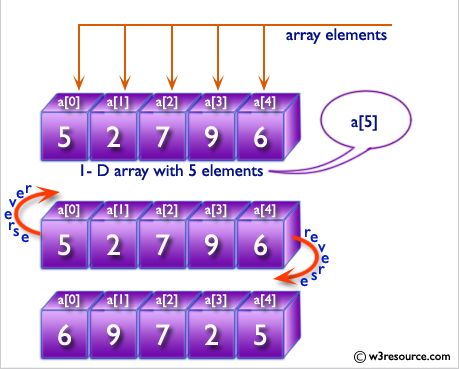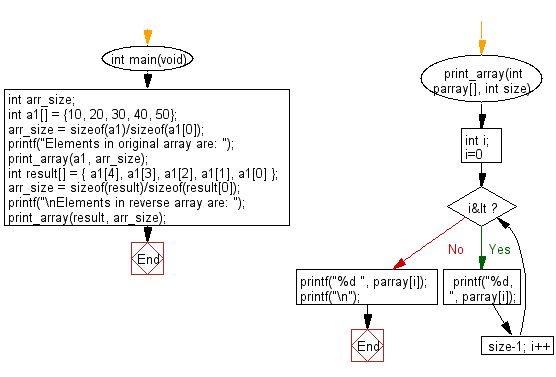C Exercises: Reverse a given array of integers and length 5
C-programming basic algorithm: Exercise-38 with Solution
Write a C program to reverse a given array of integers and length 5.
C Code:
#include <stdio.h>
#include <stdlib.h>
int main(void){
int arr_size;
int a1[] = {10, 20, 30, 40, 50};
arr_size = sizeof(a1)/sizeof(a1[0]);
printf("Elements in original array are: ");
print_array(a1, arr_size);
int result[] = { a1[4], a1[3], a1[2], a1[1], a1[0] };
arr_size = sizeof(result)/sizeof(result[0]);
printf("\nElements in reverse array are: ");
print_array(result, arr_size);
}
print_array(int parray[], int size)
{
int i;
for( i=0; i<size-1; i++)
{
printf("%d, ", parray[i]);
}
printf("%d ", parray[i]);
printf("\n");
}
Sample Output:
Elements in original array are: 10, 20, 30, 40, 50 Elements in reverse array are: 50, 40, 30, 20, 10
Pictorial Presentation:

Flowchart:

C Programming Code Editor:
Contribute your code and comments through Disqus.
Previous: Write a C program to rotate the elements of a given array of integers (length 4 )in left direction and return the new array.
Next: Write a C program to create a new array containing the middle elements from the two given arrays of integers, each length 5.
What is the difficulty level of this exercise?
Test your Programming skills with w3resource's quiz.
C Programming: Tips of the Day
Static variable inside of a function in C
The scope of variable is where the variable name can be seen. Here, x is visible only inside function foo().
The lifetime of a variable is the period over which it exists. If x were defined without the keyword static, the lifetime would be from the entry into foo() to the return from foo(); so it would be re-initialized to 5 on every call.
The keyword static acts to extend the lifetime of a variable to the lifetime of the programme; e.g. initialization occurs once and once only and then the variable retains its value - whatever it has come to be - over all future calls to foo().
Ref : https://bit.ly/3fOq7XP
- New Content published on w3resource:
- HTML-CSS Practical: Exercises, Practice, Solution
- Java Regular Expression: Exercises, Practice, Solution
- Scala Programming Exercises, Practice, Solution
- Python Itertools exercises
- Python Numpy exercises
- Python GeoPy Package exercises
- Python Pandas exercises
- Python nltk exercises
- Python BeautifulSoup exercises
- Form Template
- Composer - PHP Package Manager
- PHPUnit - PHP Testing
- Laravel - PHP Framework
- Angular - JavaScript Framework
- Vue - JavaScript Framework
- Jest - JavaScript Testing Framework
